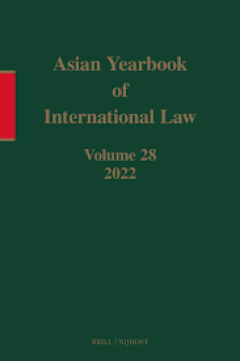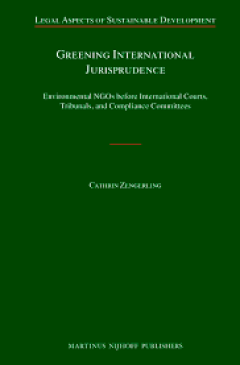Filter by

Combatting Illicit Trade on the EU Border = A Comparative Perspective
This open access book provides the first-ever comparative study on criminal policy concerning the illicit trade of tobacco, conducted among four comparatively new EU Member States (Lithuania, Poland, Slovakia and Romania) and two “old” EU countries (Germany and Italy). The book addresses the national legal frameworks, current criminological situation regarding illicit trade of tobacco, and …
- Edition
- 1
- ISBN/ISSN
- 9783030510190
- Collation
- VIII, 283 hlm; ill., lamp.,
- Series Title
- -
- Call Number
- -

Asian Yearbook of International Law, Volume 6 (1996)
The Asian Yearbook of International Law is the first publication dedicated primarily to international law as seen from an Asian perspective. It provides international law articles written by experts from the region and other articles relating to Asian topics. The editorial board, national correspondents, advisory council, and governing board comprise a diverse group of academics and government …
- Edition
- Volume: 6
- ISBN/ISSN
- 978-90-04-40065-8
- Collation
- -
- Series Title
- -
- Call Number
- -

Asian Yearbook of International Law, Volume 5 (1995)
The Asian Yearbook of International Law is the first publication dedicated primarily to international law as seen from an Asian perspective. It provides international law articles written by experts from the region and other articles relating to Asian topics. The editorial board, national correspondents, advisory council, and governing board comprise a diverse group of academics and government …
- Edition
- Volume: 5
- ISBN/ISSN
- 978-90-04-40064-1
- Collation
- -
- Series Title
- -
- Call Number
- -

Asian Yearbook of International Law, Volume 4 (1994)
The Asian Yearbook of International Law is the first publication dedicated primarily to international law as seen from an Asian perspective. It provides a forum for the publication of articles in the field of international law written by experts from the region, and also other articles relating to Asian topics. Its aim is twofold: to promote the dissemination of knowledge of international law i…
- Edition
- Volume: 4
- ISBN/ISSN
- 978-90-04-40063-4
- Collation
- -
- Series Title
- -
- Call Number
- -

Asian Yearbook of International Law, Volume 3 (1993)
The Asian Yearbook of International Law is the first publication dedicated primarily to international law as seen from an Asian perspective. It provides a forum for the publication of articles in the field of international law written by experts from the region, and also other articles relating to Asian topics. Its aim is twofold: to promote the dissemination of knowledge of international law i…
- Edition
- Volume: 3
- ISBN/ISSN
- 978-90-04-40062-7
- Collation
- -
- Series Title
- -
- Call Number
- -

Asian Yearbook of International Law, Volume 28 (2022)
Launched in 1991, the Asian Yearbook of International Law is a major internationally-refereed yearbook dedicated to international legal issues as seen primarily from an Asian perspective. It is published under the auspices of the Foundation for the Development of International Law in Asia (DILA) in collaboration with DILA-Korea, the Secretariat of DILA, in South Korea. When it was launched, the…
- Edition
- Volume: 28
- ISBN/ISSN
- 978-90-04-71812-8
- Collation
- -
- Series Title
- -
- Call Number
- -

Asian Yearbook of International Law, Volume 27 (2021)
Launched in 1991, the Asian Yearbook of International Law is a major internationally-refereed yearbook dedicated to international legal issues as seen primarily from an Asian perspective. It is published under the auspices of the Foundation for the Development of International Law in Asia (DILA) in collaboration with DILA-Korea, the Secretariat of DILA, in South Korea. When it was launched, the…
- Edition
- Volume: 27
- ISBN/ISSN
- 978-90-04-68720-2
- Collation
- -
- Series Title
- -
- Call Number
- -

Greening International Jurisprudence : Environmental NGOs before Internationa…
Greening International Jurisprudence: Environmental NGOs before International Courts, Tribunals, and Compliance Committees examines how international judicial and quasi-judicial bodies enforce international environmental law, with particular consideration to the role of environmental NGOs. The analytical structure of the study is based on four aspects of discussion and research: the enforcem…
- Edition
- -
- ISBN/ISSN
- 978-90-04-25731-3
- Collation
- xxx, 374 pp
- Series Title
- Legal Aspects of Sustainable Development, Volume: 17
- Call Number
- -

Good Governance and Modern International Financial Institutions : AIIB Yearbo…
This first volume of the AIIB Yearbook of International Law (AYIL), edited by Peter Quayle and Xuan Gao, is based upon the inaugural 2017 AIIB Legal Conference, both titled, Good Governance and Modern International Financial Institutions (IFIs). Following a Preface by the General Counsel of the AIIB and General Editor of AYIL, Gerard Sanders, and an Introduction by the Editors, this volume of A…
- Edition
- -
- ISBN/ISSN
- 978-90-04-40832-6
- Collation
- xii, 266 pp
- Series Title
- AIIB Yearbook of International Law, Volume: 1
- Call Number
- -

Global Antisemitism: A Crisis of Modernity
This volume contains a selection of essays based on papers presented at a conference organized at Yale University and hosted by the Yale Initiative for the Interdisciplinary Study of Antisemitism (YIISA) and the International Association for the Study of Antisemitism (IASA), entitled “Global Antisemitism: A Crisis of Modernity.” The essays are written by scholars from a wide array of discip…
- Edition
- -
- ISBN/ISSN
- 978-90-04-26556-1
- Collation
- xii, 352 pp.
- Series Title
- -
- Call Number
- -
 Computer Science, Information & General Works
Computer Science, Information & General Works  Philosophy & Psychology
Philosophy & Psychology  Religion
Religion  Social Sciences
Social Sciences  Language
Language  Pure Science
Pure Science  Applied Sciences
Applied Sciences  Art & Recreation
Art & Recreation  Literature
Literature  History & Geography
History & Geography